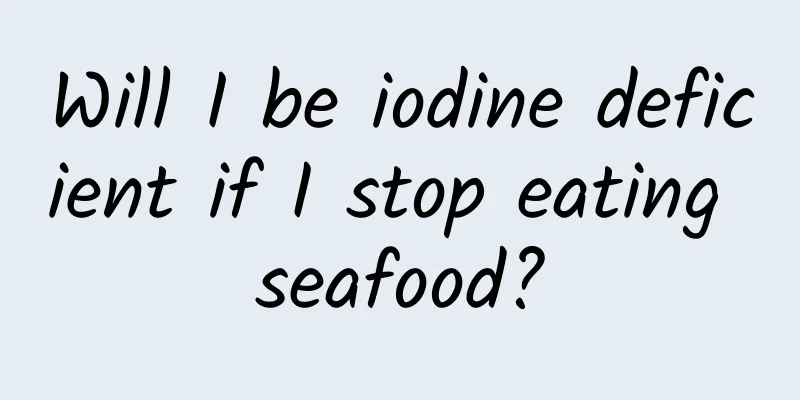Will I be iodine deficient if I stop eating seafood?

|
In the age of universal iodine supplementation, people who grow up near the sea often worry that they have eaten too much iodine. Everyone knows that seafood is rich in iodine. Do people near the sea still need to eat iodized salt? Recently, salmon from Xinfadi was contaminated with the new coronavirus. Many people no longer eat seafood. Will they be deficient in iodine? The iodine content in food varies greatly. Generally speaking, seafood contains more iodine than terrestrial products, and animal products contain more iodine than plant products. As we all know, seaweeds such as kelp and laver have the highest iodine content, which is usually dozens or even hundreds of times higher than other foods. Marine fish, shrimp, and seashells are foods with relatively high iodine content. Meat, eggs, and milk can also provide some iodine, while fruits, vegetables, and grains have relatively low iodine content. How much do these foods contribute to the body's iodine intake? Overall, kelp, seaweed and marine fish only provide about 2% of the iodine intake of Chinese people. Even if all foods are added together, the iodine provided is quite limited. Statistics show that 80% of the iodine consumed by Chinese people comes from iodized salt, and iodized salt is more important in inland provinces with fewer aquatic products. In some places, residents almost exclusively consume iodine from iodized salt, such as Ningxia. Even in high-iodine areas where non-iodized salt is supplied, about 90% of the iodine consumed by people comes from local drinking water, and seafood is not the main source. This is the general situation, but what about the situation at the seaside? Many people think that since coastal residents eat seafood every day, iodized salt is not important. In fact, this is a misunderstanding. On the one hand, except for kelp and seaweed, the iodine content of other seafood is not that high. On the other hand, people living by the sea do not eat seafood every day. For example, iodized salt accounts for about 60% of the iodine intake of residents in Zhejiang Province, while in Liaoning Province it accounts for more than 90%. About 30% of the iodine intake of residents in coastal cities in Zhejiang comes from seaweed and kelp, which is already a high proportion, but iodized salt is still the main source. Are coastal cities really lacking in iodine? Data from Zhejiang Province in 2011 showed that 50% of adults in Zhoushan, Ningbo and Taizhou (coastal areas) had iodine intake below the daily requirement (120 micrograms), while this proportion was only 8% in Jinhua, Quzhou and Lishui (inland areas). This phenomenon may seem abnormal, but it is actually very common. There has always been a stereotype that mountainous areas, rural areas and inland areas are prone to iodine deficiency. As a result, these areas pay special attention to iodine supplementation, and the coverage and qualification rates of iodized salt are high, while plains, cities and coastal areas have become iodine nutrition depressions. Pregnant women and nursing mothers are the most common groups of people who are deficient in iodine. This is because they are in a special physiological state and their iodine needs are greater than those of the general population. Iodine deficiency in pregnant women and nursing mothers will affect the brain development of their children, which means that the children will be a little dumber. According to the World Health Organization's criteria, the proportion of pregnant women with iodine deficiency in Liaoning, Fujian, Zhejiang and Shanghai is not low. Among them, the proportion of pregnant women with iodine deficiency in Shanghai exceeds 50%, which is higher than many inland cities. The iodine deficiency problem of pregnant women and nursing mothers is difficult to solve with iodized salt. Some countries recommend additional iodine supplementation through dietary supplements. The "Dietary Guidelines for Chinese Residents" emphasizes the importance of health examinations, understanding iodine nutritional levels through urine iodine indicators, and reasonable iodine supplementation. In addition to eating iodized salt, it is recommended for pregnant women to eat iodine-rich seafood (kelp, seaweed, mussels) once a week, pregnant women are recommended to eat 1-2 times a week, and nursing mothers are advised to eat more seafood. So the conclusion is that it is necessary to eat iodized salt, whether in coastal areas or inland areas, as long as it is not a high-iodine area. However, it should be emphasized that the source of iodine intake is related to the dietary structure. Although most people rarely eat kelp and laver, a few people who particularly like to eat laver and kelp should still pay attention to the risk of excessive iodine. Trivia The distribution of iodine in a whole kelp is uneven. Do you think the content is higher near the top or the root? I guess many people think that the roots are older and should have accumulated more iodine. In fact, it is the opposite. The iodine content is higher near the top and the edge. |
<<: Will you develop color blindness later in life? You must know these misunderstandings
>>: Why do so many people like to go to Lhasa? What lakes are near Lhasa?
Recommend
Abnormal liver function? ! Don’t ignore it, take it seriously!
When I was looking at the hot searches today, a p...
What to do if nipples turn black
The darkening of nipples cannot be ignored. You s...
Why does my waist hurt before and after menstruation?
Women's menstruation is mainly for the metabo...
What should I do if I have cervical erosion after pregnancy?
When women are pregnant, problems always arise on...
For people with heart disease, walking is the most suitable form of exercise, and exercising the lower limbs is safer.
An elderly friend told Huazi that he had coronary...
After school starts, two diseases are prevalent, parents must pay attention →
After the spring semester begins, hand, foot and ...
What side dishes are good for boiled duck? What side dishes are good for boiled duck?
We all know that duck meat is a common meat food....
Winter Solstice Exercise Guide: Don’t Stay in Bed Anymore
Hello everyone, winter is cold, with insufficient...
6 signs of healthy kidneys, how many do you meet?
1. No swelling in the morning Healthy people usua...
What is the method to make your private parts pink?
The darkening of the private parts is a relativel...
What is the most effective way to treat fallopian tube disease?
According to surveys, many infertile women curren...
Treatment of multiple breast cysts
The disease of multiple breast cysts mainly occur...
How to check for fallopian tube tuberculosis? Diagnosis of Fallopian Tuberculosis
There are some things to note when checking for f...









